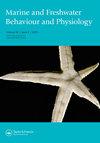在偏振光场中扫描口足类甲壳类动物Neogonodactylus oerstedii的眼球运动
IF 1.1
4区 生物学
Q3 MARINE & FRESHWATER BIOLOGY
Marine and Freshwater Behaviour and Physiology
Pub Date : 2018-07-04
DOI:10.1080/10236244.2018.1543544
引用次数: 2
摘要
口足类甲壳类动物具有高度可移动、独立运动的复眼,它们对线偏振光和圆偏振光都很敏感。当观察线偏振目标时,它们将眼睛旋转到可预测的角度,并经常扫描眼睛以获取视野样本。扫描角度大致垂直于中带平面(一组专门的平行赤道小眼)。我们研究了一种加勒比口足动物(Neogonodactylus oerstedii)在垂直极化、水平极化或去极化的均匀视野下的扫描眼运动。我们发现,在这些不同的治疗方法中,平均眼旋转和扫描角度有显著差异。平均扫描角相差12°,在垂直极化场中比在水平极化场中更水平,在垂直极化场中也比在去极化场中更水平。因此,这些口足类动物调整视觉扫描以适应视觉环境的极化。本文章由计算机程序翻译,如有差异,请以英文原文为准。
Scanning eye movements of the stomatopod crustacean, Neogonodactylus oerstedii, in polarized light fields
ABSTRACT Stomatopod crustaceans have highly mobile, independently moving compound eyes that are sensitive to both linearly and circularly polarized light. They rotate their eyes to predictable angles when viewing a linearly polarized target, and they scan their eyes frequently to sample the visual field. Angles of scans are roughly perpendicular to the plane of the midband (a set of specialized parallel rows of equatorial ommatidia). We investigated scanning eye movements in one Caribbean stomatopod species (Neogonodactylus oerstedii) in uniform visual fields that were vertically polarized, horizontally polarized, or depolarized. We found that mean eye rotation and scan angles differed significantly among these different treatments. Average scan angles differed by 12°, being more horizontal in a vertically polarized field than in a horizontally polarized one, and also more horizontal in a vertically polarized field than in a depolarized field. Thus, these stomatopods adjusted visual scanning to the polarization of the visual environment.
求助全文
通过发布文献求助,成功后即可免费获取论文全文。
去求助
来源期刊

Marine and Freshwater Behaviour and Physiology
生物-海洋与淡水生物学
CiteScore
2.10
自引率
0.00%
发文量
9
审稿时长
>12 weeks
期刊介绍:
Marine and Freshwater Behaviour and Physiology is devoted to the publication of papers covering field and laboratory research into all aspects of the behaviour and physiology of all marine and freshwater animals within the contexts of ecology, evolution and conservation.
As the living resources of the world’s oceans, rivers and lakes are attracting increasing attention as food sources for humans and for their role in global ecology, the journal will also publish the results of research in the areas of fisheries biology and technology where the behaviour and physiology described have clear links to the contexts mentioned above.
The journal will accept for publication Research Articles, Reviews, Rapid Communications and Technical Notes (see Instructions for authors for details). In addition, Editorials, Opinions and Book Reviews (invited and suggested) will also occasionally be published. Suggestions to the Editor-In-Chief for Special Issues are encouraged and will be considered on an ad hoc basis.
With the goal of supporting early career researchers, the journal particularly invites submissions from graduate students and post-doctoral researchers. In addition to recognising the time constraints and logistical limitations their research often faces, and their particular need for a prompt review process, accepted articles by such researchers will be given prominence within the journal (see Instructions for authors for details).
 求助内容:
求助内容: 应助结果提醒方式:
应助结果提醒方式:


